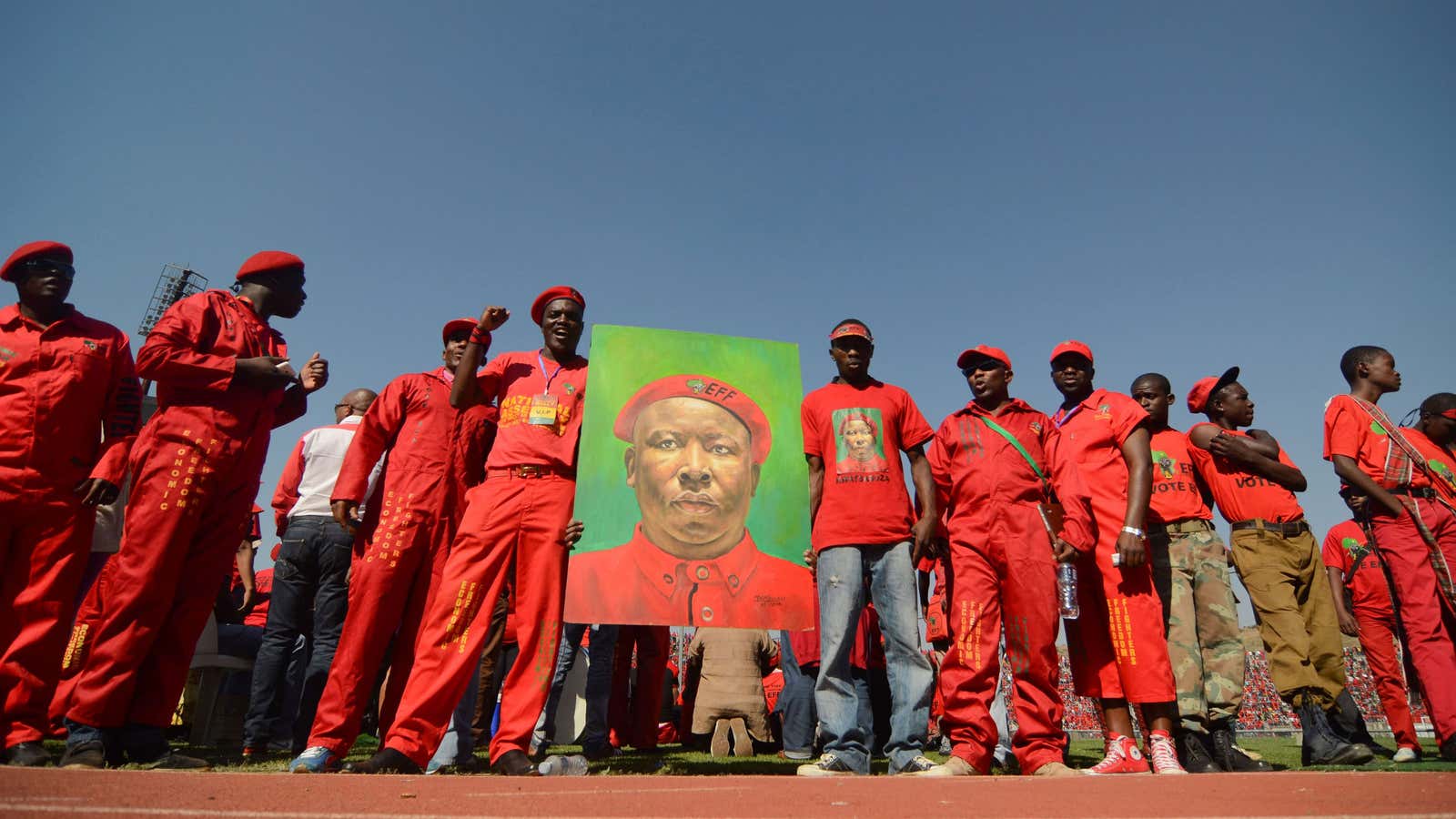Julius Malema and the Fighters. They sound like a rock band. But in fact they are a political party, formed almost 10 months ago and already a hit in South Africa. The Economic Freedom Fighters (EFF) contested their first election this month, coming in third place and unseating parties and leaders on the ballot for decades.
This week, as their members lined up to be sworn in as members of parliament, they reminded the country why they have become the most talked about political party in the country. They came dressed in red overalls and hard hats, tunics with headscarves and aprons—the work wear of domestic workers and gardeners and uniform of the miners currently waging a strike over fair pay. Their garb sent a message of solidarity to the poor majority they claim to represent. But it was also effective in upstaging their opponents and stealing media attention—a refreshing change in the stale air of South Africa’s political scene.
Their red berets have become such a talking point that they began selling out. The Democratic Alliance (DA) and the African National Congress (ANC) also are accused of copycatting and slapping their own logos during campaigning.
The EFF has exploited socialist imagery with aplomb, and Malema, or his advisers, have proven a marketing maverick. When Agang (the other political baby in South Africa) launched in February 2013, it did so in the safety of the historic walls of Constitution Hill, hoping that a heritage of struggle would render it significant. The EFF, on the other hand, will be remembered for celebrating coming into existence on top of the hill that is the country’s current symbol of economic strife, Marikana, where scores of miners were shot dead by police. Agang only managed two seats in parliament. EFF: 25.
Their election rallies stood out too. They closed off their campaign with a thumping gathering, dubbed by one online media outlet as Julius Malema & The Rally That Rocked. The Daily Maverick described the EFF’s mass meeting as cool and the ANC’s dull: “This is politics on steroids, politics as pageantry, politics as performance art.”
The irony is that band leader Julius Malema, affectionately (once derisively) called Juju, was once thought to have been a political has-been after expulsion from the ANC. But he’s come back to grab the media spotlight, making an about turn from having once declared he’d die for president Jacob Zuma when he was ANC Youth League leader.
His rise has stupefied the privileged class scared of his call for nationalization. And it’s excited the poor, that their voice will be heard above the ANC they believe has forgotten their dreams. There are many more in the middle who’d like to believe in Malema. But it’s hard to trust him just yet. He still has a corruption trial hanging over his head and is criticized for living large while claiming to represent the poor—both of which he never seems to take seriously.
But South Africans can all agree on this: Malema and his fighters have re-energized politics. To the delight of Twitter, he proclaimed in a recent radio interview: ”Some people call me Commander-In-Thief, while others call me Juju Baby.” It’s a break from the 15 years after Mandela, the only president to show any wit and who broke from tradition with his signature Madiba shirts.
Under Thabo Mbeki and his single-minded African Dream, we were either lectured or ignore. While Jacob Zuma seems oblivious to even the fact that he is the butt of jokes. The EFF and Malema, crass as his humor sometimes is, will be welcome reprieve. And hopefully they will also shield us from the shrillness that’s become the collective voice of the opposition.
Last Sunday, as I hosted an early morning radio show, an EFF member called just after midnight. Sounding elated, he had spent the whole day at the EFF celebration the day previous. He was calling to tell us just how much fun it had been. That was followed by more calls from jubilant EFF followers.
Then a 68-year-old pensioner came on the line. He had also voted for Julius Malema, though he was not a card-carrying member. He lived in a rented room, he said. He didn’t want to live in a shack, so he sacrifices half his pension to keep this space. You know what I eat, he asked. “Every day, I eat bread and tea. Every day. I wish Julius Malema could come see me he said, over and over. I wish he could come see how I live.”
They EFF are now the custodians of that poor man’s hope. Their staying power rests on whether they actually show up to mend the broken dreams of those, like the old man, who once voted for the ANC.
The true influence of the EFF will be tested in parliament. Malema might turn out to be a charlatan, and his fighters have brief stay in political history. At the very least, they’ve put back some color back into politics.
